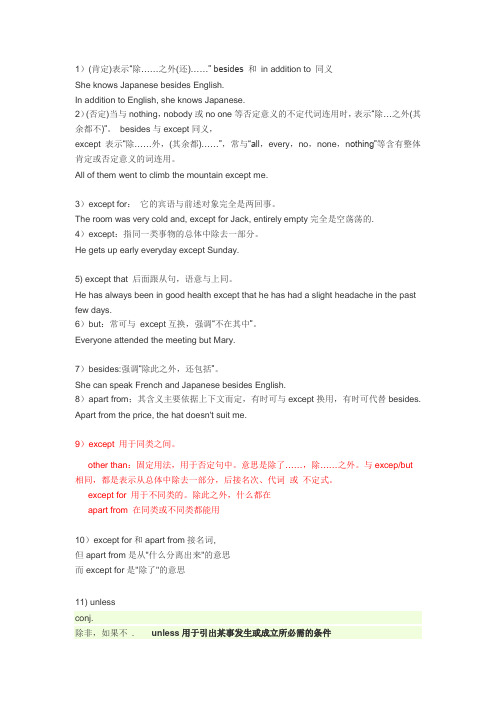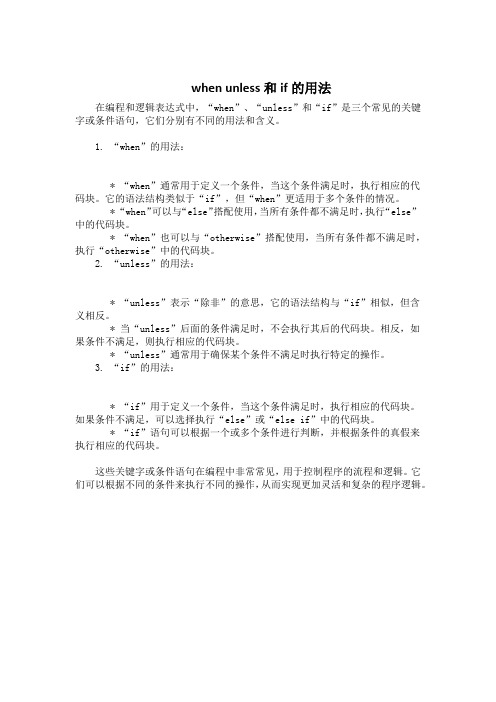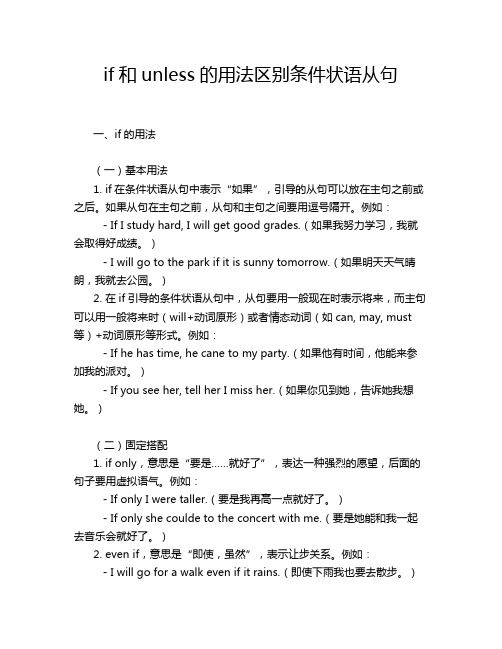unless的用法
unless 与 if not

Unless 与 if not1. unless 与if … not 都可以用来引导条件状语从句, unless 的语气较重,从句中的动词用一般现在时代替一般将来时。
例如:We will visit the Great Wall tomorrow unless it rains.除非明天下雨,否则我们就去参观长城。
I won't believe what you said unless I've seen it with my own eyes.我要亲眼所见才能相信你所说的。
Don't enter the lab unless you are permitted to.只有经过允许才能进入实验室。
2. 有的同学在遇到使用 unless 的句子时,弄不清该用肯定还是否定而出错。
这时最好的办法是将 unless 替换成if … not 的结构,从而就一目了然了。
例如:I won't go to the party unless I am invited. ( =I won't go to the party if I am not invited. )如果没有人邀请我,我是不会去参加聚会的。
3. 由于 unless 与if … not 的语气不同,有时两者替换后,其意思就不一样了。
例如:Unless he were my friend, I shouldn't expect his help.除非他是我的朋友,我才会期待他的帮助。
(本句的潜在意思为:他并不是我的朋友。
)If he were not my friend, I shouldn't expect his help.如果他不是我的朋友,我就不会期待他的帮助了。
(本句的潜在意思为:正因为他是我的朋友,我才会期待他的帮助。
)4. 在平时使用过程中,要注意 unless 与 until 的区别。
except besides unless (除了)区别和用法

1)(肯定)表示“除……之外(还)……” besides 和in addition to 同义She knows Japanese besides English.In addition to English, she knows Japanese.2)(否定)当与nothing,nobody或no one等否定意义的不定代词连用时,表示“除…之外(其余都不)”。
besides与except同义,except 表示“除……外,(其余都)……”,常与“all,every,no,none,n othing”等含有整体肯定或否定意义的词连用。
All of them went to climb the mountain except me.3)except for:它的宾语与前述对象完全是两回事。
The room was very cold and, except for Jack, entirely empty完全是空荡荡的.4)except:指同一类事物的总体中除去一部分。
He gets up early everyday except Sunday.5) except that 后面跟从句,语意与上同。
He has always been in good health except that he has had a slight headache in the past few days.6)but:常可与except互换,强调“不在其中”。
Everyone attended the meeting but Mary.7)besides:强调“除此之外,还包括”。
She can speak French and Japanese besides English.8)apart from;其含义主要依据上下文而定,有时可与except换用,有时可代替besides. Apart from the price, the hat doesn't suit me.9)except 用于同类之间。
when unless和if的用法 -回复

when unless和if的用法-回复Unless 和if 是两个常用的条件状语从句引导词,用于表示某个条件成立或者不成立时会发生的情况。
它们在语法结构和使用方式上有一些不同之处。
接下来,我将逐步解释这两个引导词的用法。
首先,我们来看一下"unless" 的用法。
"Unless" 引导的条件状语从句表示在某种情况下不成立的条件。
它的意思可以等同于"if not"。
比如:1. Unless it rains, we will have a picnic tomorrow.(除非下雨,否则我们明天要去野餐。
)2. You can go to the party tonight unless you have a test tomorrow. (除非你明天要考试,否则今晚你可以去参加派对。
)"Unless" 引导的条件状语从句可以出现在主句的前面或者后面,没有语序限制。
接下来,我们来看一下"if" 的用法。
"If" 引导的条件状语从句表示某种条件成立时会发生的情况。
它可以表示实际的条件,也可以表示虚拟的条件。
比如:1. If it rains, we will stay at home.(如果下雨,我们会待在家里。
)2. If I were you, I would study harder.(如果我是你,我会更加努力学习。
)需要注意的是,在虚拟条件句中,谓语动词要使用过去式,例如上面例句中的"were"。
此外,"if" 还可以引导一个条件状语从句,与主句用逗号分隔开来。
这种用法常见于表示建议、嘱咐或者提醒的句子中。
比如:1. If you have any questions, please feel free to ask.(如果你有任何问题,请随时提问。
when unless和if的用法

when unless和if的用法
在编程和逻辑表达式中,“when”、“unless”和“if”是三个常见的关键字或条件语句,它们分别有不同的用法和含义。
1. “when”的用法:
* “when”通常用于定义一个条件,当这个条件满足时,执行相应的代码块。
它的语法结构类似于“if”,但“when”更适用于多个条件的情况。
* “when”可以与“else”搭配使用,当所有条件都不满足时,执行“else”中的代码块。
* “when”也可以与“otherwise”搭配使用,当所有条件都不满足时,执行“otherwise”中的代码块。
2. “unless”的用法:
* “unless”表示“除非”的意思,它的语法结构与“if”相似,但含义相反。
* 当“unless”后面的条件满足时,不会执行其后的代码块。
相反,如果条件不满足,则执行相应的代码块。
* “unless”通常用于确保某个条件不满足时执行特定的操作。
3. “if”的用法:
* “if”用于定义一个条件,当这个条件满足时,执行相应的代码块。
如果条件不满足,可以选择执行“else”或“else if”中的代码块。
* “if”语句可以根据一个或多个条件进行判断,并根据条件的真假来执行相应的代码块。
这些关键字或条件语句在编程中非常常见,用于控制程序的流程和逻辑。
它们可以根据不同的条件来执行不同的操作,从而实现更加灵活和复杂的程序逻辑。
if,evenif,whether,unless,butfor等词的用法

If, even if, whether, unless, but for, otherwise, provided, suppose1.Even if (=even thought即便)请比较下面两个例句:You must go tomorrow if you are ready.如果你准备好了,明天你必须走。
You must go tomorrow even if you aren’t ready.哪怕你没有准备好,明天你也得走。
2.Whether…or (=if…or是否)You must go tomorrow whether you are ready or not.无论你明天是否准备好了,你都必须走。
3.Unless+肯定动词(=if+否定动词除非)Unless you start at once you’ll be late. 相当于:If you don’t start at once you’ll be late.除非你立即动身,否则你就会迟到。
Unless you had a permit you couldn’t get a job. 相当于:If you hadn’t a permit you couldn’t get a job.除非你有执照,否则你就找不到工作。
4.but for (=if it were not for /if it hadn’t been for 不然)my father pays me fees. But for that I wouldn’t be here.我父亲给我一笔补贴费。
不然我就不会在这里了。
The car broke down. But for that we would have been in time.汽车出毛病了。
要不是那个我们会及时赶到的。
5.otherwise (=if this doesn’t happen/didn’t happen/hadn’t happened否则)we must be back before midnight; otherwise we’ll be locked out.我们必须在午夜之前赶回去,否则我们就会被锁在门外。
if和unless的用法区别条件状语从句

if和unless的用法区别条件状语从句一、if的用法(一)基本用法1. if在条件状语从句中表示“如果”,引导的从句可以放在主句之前或之后。
如果从句在主句之前,从句和主句之间要用逗号隔开。
例如: - If I study hard, I will get good grades.(如果我努力学习,我就会取得好成绩。
)- I will go to the park if it is sunny tomorrow.(如果明天天气晴朗,我就去公园。
)2. 在if引导的条件状语从句中,从句要用一般现在时表示将来,而主句可以用一般将来时(will+动词原形)或者情态动词(如can, may, must 等)+动词原形等形式。
例如:- If he has time, he cane to my party.(如果他有时间,他能来参加我的派对。
)- If you see her, tell her I miss her.(如果你见到她,告诉她我想她。
)(二)固定搭配1. if only,意思是“要是……就好了”,表达一种强烈的愿望,后面的句子要用虚拟语气。
例如:- If only I were taller.(要是我再高一点就好了。
)- If only she coulde to the concert with me.(要是她能和我一起去音乐会就好了。
)2. even if,意思是“即使,虽然”,表示让步关系。
例如:- I will go for a walk even if it rains.(即使下雨我也要去散步。
)- Even if he doesn't like me, I still want to be his friend.(即使他不喜欢我,我仍然想成为他的朋友。
)(三)双语例句1. If you love someone, should you tell them?(如果你爱一个人,你应该告诉他们吗?)2. If we don't protect the environment, where will we live in the future?(如果我们不保护环境,我们将来住在哪里呢?)3. If the cat gets out of the house, it might get lost.(如果猫跑出房子,它可能会迷路。
unless的用法

小议“unless”的用法(2009-09-17 17:54:11)转载标签:unless的用法教育分类:英语学习在英语教学中,我们发现学生在使用貌似简单的unless时经常出错,众多词典和语法书讲解又不够详细,因此本文拟就以下方面作必要说明。
一、unless的基本用法连词unless意为“除非……如果不……”,“除了……”,多引导一个否定意义的真实条件句,有时也可引导非真实条件旬。
unless引导条件句时,主要用于下列情况。
(1)主句为肯定句。
如:Unless I visit every bookstore in town.I shall not know whether I can get what l want.如果我不到城里每一家书店去看看,我就不知道是否能买到我想要的书。
You will miss the bus unless you hurry up.你要不快点就会错过班车。
You’ll fail in chemistry again unless you work harder.如果你不再加把劲,你化学考试还会不及格。
(2)主句为否定句。
如:Unless you oil the motor regularly.it won’t run smoothly.要不是你经常给发动机上油。
它就不会转得那么顺畅。
I wouldn't be saying this unless I were sure of the facts.要是我对这些事情没有把握,我就不说这话了。
You will never get anywhere unless you have set your goal.如果你不设定目标,你哪儿也去不了。
二、应注意的一些问题1.unless不能与if'"not换用的情况unless在意义上相当于if...not,因此在有些场合中unless与if...not可互换使用。
if 和 unless 用法(推荐文档)

课前检测
• If you __ 买something on sale ,you __ • 节约 money. • 完成上题并回忆if的用法。
如果谈论的是‘如果’某一个动作或事情发生 后,很可能将会产生某种结果,那么在复句中主 句的动词用一般将来时,而if从句仍然是一般 现在时。
e.g. If it rains, we won’t take a hike tomorrow. He will get up school on time if the clock goes off. If he arrives in Hong Kong, he will call me.
Unless you take more care, you’ll have an accident.( 如果不多加小心的话,你会出事故的。)
2. My baby sister never cries unless she is hungry. ( 我那刚出生的妹妹除非se anything unless you’re 100 per cent sure.(不要作任何的许诺, 除非你有百分百的把握。) 4. Unless bad weather stops me, I jog every day. (除 非坏天气作梗,每天我都慢跑。) 误:Don't come in unless you will be invited to. 正:Don't come in unless you're invited to. 误:Unless he will come, we won't be able to go. 正:Unless he comes, we won't be able to go. raise 和rise 都有“举起”的意思。 Raise是及物动词。 Rise 是不及物动词。 例如: If you want to ask a question, first raise your
- 1、下载文档前请自行甄别文档内容的完整性,平台不提供额外的编辑、内容补充、找答案等附加服务。
- 2、"仅部分预览"的文档,不可在线预览部分如存在完整性等问题,可反馈申请退款(可完整预览的文档不适用该条件!)。
- 3、如文档侵犯您的权益,请联系客服反馈,我们会尽快为您处理(人工客服工作时间:9:00-18:30)。
unless的用法
Unless是英语中常用的一个连词,它可以用来表达条件状语从句,表示“除非”、“如果不”之意。
一般来说,unless表达的是“万一发生某种情况”时另一种可能发生的事情,因此,它通常表示与假设相反的情况、出乎意料的情况或对于现实的反抗。
1、unless的词性
Unless一个连词,常用来连接句子,其词性为副词。
2、unless的用法
(1)用于肯定句:
Unless放在句首时,其后要加陈述句,主句一般用肯定形式: Unless you make an effort, you can expect to achieve any success.除非你付出努力,否则你不能指望取得什么成功。
(2)用于否定句:
Unless放在句首时,其后要加否定句,主句一般用否定形式: Unless you have the help from a teacher, you can learn something new.非你获得老师的帮助,否则你不能学习新的东西。
(3)用于疑问句:
Unless的后面可以接一个宾语从句:
Unless what is the answer?除非什么是答案?
(4)用于虚拟语气:
Unless可以用于虚拟语气,例如:
Unless you had made an effort to pass the exam, you would
have failed.非你努力参加考试,否则你会考试不及格。
(5)用于反意疑问句:
Unless可以用在反意疑问句,例如:
Unless you do it by yourself, who will do it for you? 你除非自己做,否则谁来替你做呢?
(6)用于感叹句:
Unless可以用于倒装句,例如:
Unless the weather is fine tomorrow, we won be able to go out.非明天天气好,否则我们就无法外出了。
(7)用于表示条件:
Unless在表达条件时,意思为“如果……不”:
We can afford to go on vacation unless we save some money.非我们攒了些钱,否则我们就不能度假去。
3、unless的例句
(1)Unless you try new things, you never know what you are capable of.
(2)Unless you take a risk, you never get the reward.
(3)Unless we act now, the planet will be destroyed.
(4)Unless you give it your best shot, you won get the job done.
(5)Unless you work hard, you won be able to pass the exam.
(6)Unless you believe in yourself, no one else will.
总结
Unless是一个灵活的词,可以用于肯定句、否定句、疑问句、虚拟语气,也可以用于反意疑问句及表示条件的句子中。
它的主要用途是描述一种可能的结果,表示“要么……要么……”的意思,引导条件状语从句,它是英语中一个非常重要的连词,用在句子中可以提供精彩,更有语言表达魅力,是非常有效的一种表达方式,因此可以多多运用。
